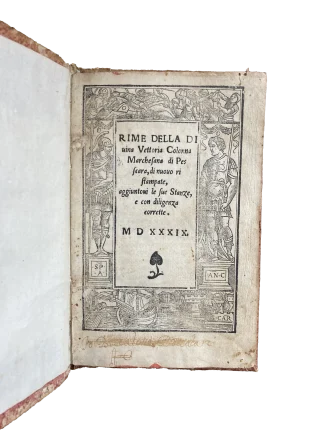COLONNA, Vittoria.
Rime della Divina Vittoria Colonna.
[Venice?], [N. Zoppino?], 1539.£2,350.00
8vo. 48 unnumbered ll., lacking final blank. Italic letter. Title within decorated woodcut border. Light yellowing, occasional slight marginal finger-soiling or minor ink marks, small holes to t-p (one just touching title border) and very minor worming to extreme upper and lower blank corners of title and following. A good wide margined copy in C18 pink paper boards, ms waste visible within pastedowns, C18 printed paper label with ms ‘Colonna’ to spine, a.e.r., a little scuffed, C16 ms autograph ‘Jo[annes] Boccalone Boccalari’ at foot of title.
A good copy of the third edition of this most popular poetic collection by the Italian poetess and noblewoman Vittoria Colonna (1492-1547), marchioness of Pescara. Based in Ischia, near Naples, and married to a military captain who died in 1525, Vittoria Colonna also travelled to Rome, Ferrara and Venice, for scholarly and philanthropic purposes. Among her literary acquaintances were Pietro Bembo, Luigi Alamanni, Ludovico Ariosto (who praised her in his ‘Orlando Furioso’), Baldassare Castiglione and Marguerite de Navarre, as well as Italian Reformers such as Ochino. First published in 1538, without her consent, her ‘Rime’ were very successful throughout the C16. The poems, based on the Petrarchan model, comprise love lyrics in memory of her husband, Ferrante Francesco d’Avalos, ‘who is transformed into a spiritual guide for the grieving lover in the manner of Petrarch’s Laura’ (Morrone, p.492). The first poem begins with an explanation of her literary efforts: ‘I write solely to give vent to my inner pain’. Generally, her metaphors focus around the eyes, the sun, the heavens and light more generally, whether spiritual or more earthly. Her later rimes reflect the passing of time and the transformation of her love into a more spiritual and religious kind, imbued with Christian Neo-Platonism. ‘It seems clear that Colonna perceived some fundamental difference between the acceptable and decorous dissemination of works in manuscript and the wholly unwelcome shift into print production, no doubt for reasons of aristocratic status as well as the modesty of her sex’, leading to ‘the author’s distance from such printed works, and her refusal to collaborate on any level’, even after Bembo’s encouragement (Brundin, p.31). In the last years of her life, Vittoria Colonna became closely acquainted with Cardinal Reginald Pole, then based in Viterbo with a cricle of reformers; with him she entertained an extensive correspondence and to whom, she stated, she owed her own salvation. An important collection, by one of the major female authors of the C16.
USTC 823531; EDIT16 CNCE 14909 (attributed to the Venetian printer N. Zoppino); Erdmann 104. Not in Gay, Hull or Gamba. Encyclopedia of Italian Literary Studies, ed. G. Morrone (2007); A. Brundin, Vittoria Colonna and the Spiritual Poetics of the Italian Reformation (2016).




